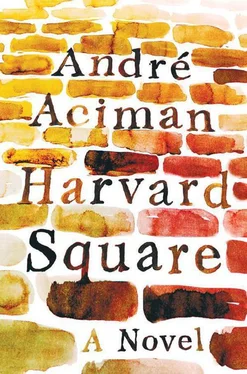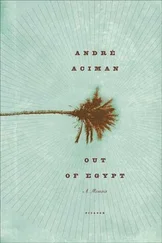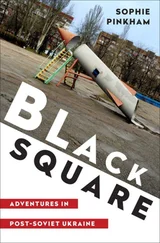At another time when a black man told him to turn off the Om Kalsoum tape he’d been playing en sourdine , Kalaj once again screeched on the brakes, and when the man refused to step out of the car and indeed threatened to fight it out, Kalaj simply turned around and shouted, “My ancestors sold yours into slavery — now get out before I do the same to you.”
Kalaj, who never once said anything against Jews, had told a Jewish passenger, who’d heard him listening to Arabic music and refused to tip him because he was an Arab, that it was a great pity they hadn’t shipped his grandmother and his baby father straight into the gas chambers, because, given the chance, he would have loved to light the ovens himself.
He knew where to hurt.
He must have known exactly where I’d hurt. He never touched that spot.
I MET KALAJ over coffee almost every evening after that, sometimes by pure chance, sometimes because we both happened to be at Café Algiers at the same time, sometimes because neither of us knew what to do when the Indian summer evenings wore on long after we’d worked ourselves to exhaustion. I would read all day, pretend I was elsewhere, and find all manner of ways to avoid worrying that the new academic year was just round the corner. I didn’t want to think of the academic year with all of its attendant duties and obligations: teaching, tutorials, committee of this and that, responsibilities at Lowell House, students to meet and interview, departmental parties and get-togethers — to say nothing of my second attempt at passing comprehensives in mid-January and, if I succeeded, my orals following immediately after. Lloyd-Greville had told all first-year graduate students to read every book in the English Literature library. Was he serious, I had asked a fourth-year graduate student. He never jokes, he replied. The joke was on me. I knew I was allowing Kalaj to distract me from my work; I knew there’d be a price to pay soon enough; perhaps I even wanted to pay that price. But the thought of losing Harvard would wake me up at night and stir up a massive state of panic. There was no sleeping after that. One night, I woke up with such an overwhelming feeling of dread that all I wished to do was write a poem to a woman I had loved years earlier and had completely lost track of. On another night I started writing what I was sure was going to bring me a substantial income: a pornographic tale about two rogue nuns in a convent. Usually, though, all I did was warm up some milk and try to imagine that someone close by had warmed it for me before heading back to bed. I’d eventually fall asleep on my couch. Sometimes watching dawn from my bedroom window overlooking so many rooftops made me think of the beach, and thinking of the beach brought peace in my heart. If you refused to look out to check the window, the illusion of a resort town lingered, and that was good.
Lloyd-Greville had had Mary-Lou call me to make an appointment. He wanted to discuss Chaucer with me. “Which tale?” I asked her. “All Chaucer,” she replied, as though I’d yet once more forgotten what kind of institution Harvard was. The appointment was set for mid-September, following Lloyd-Greville’s return from Russia. He taught Russian literature to Russians. He was — I should have known — fluent in Russian as well.
I knew that spending time at Café Algiers was not helping my reading regimen, but Café Algiers helped stave off the many phantoms that seemed to haunt me even during my waking hours. It also occurred to me that, despite having a few friends in Cambridge, I had never been so close or on such intimate terms with anyone else in my life as I was with Kalaj, and I didn’t want to lose this. We had a little world all our own here, a house-of-cards world with its house-of-cards cafés and house-of-cards rituals held together by our house-of-cards France. We called Café Algiers Chez Nous , because it was so obviously made for the likes of us — part North African, part faux-French, part dreamplace for the displaced, and always part-something-from-somewhere-else for those who were neither quite here nor altogether elsewhere. At Café Algiers we always ordered a cinquante-quatre and later a glass of wine with chili at Anyochka’s, which he liked to call la soupe populaire , the soup kitchen. Wine, all wines, he nicknamed un dollar vingt-deux : his girlfriend, when she soon became his girlfriend, mon pléonasme ; and Linda from my building, whose name he refused to remember, la quarante-deux. His other recent conquest never got a name: she remained Miss Bathroom Problems. Césarion’s, we both agreed, was le petit trou , the little hole, and the Harvest, pronounced Arvèst , with the accent on the last syllable, became Maxim’s , or sometimes, le grand trou. Casablanca, for some reason, never got baptized and remained Casablanca. Our daily walks usually took us from Maxim’s to la soupe populaire , with an occasional stop back Chez Nous. Chez Nous was where we read, played backgammon, made friends, and on certain evenings would sit around and listen to Sabatini. From time to time, the guitarist would bring his star pupil along who’d know to play the Andante spianato , because Kalaj always begged to hear it. On Sundays evenings, once the school year got under way, we’d always manage to catch an art film at the Harvard Epworth Church, for a dollar each. He called it going to Mass .
He renamed everything around him to snub the world and show there were other ways of seeing and calling things and that everything had to go through baptismal fire to be cleansed of all cant and pieties before he’d let them into his world. It was his way of reinventing the world in his own image, or in the image of what he wanted the world to be — his way of taking this cold, inhospitable, ersatz, shallow town and bringing it down a few notches to see it turn into a kinder, more intimate, more complicit, sunnier place that would open up a secret passageway for him and ultimately yield to him with a smile — if only, like Ali Baba, he could find the right nickname for it in this French language of his own invention. He defaced the world by applying improvised monikers, leaving his fingerprint on everything he touched in the hope that the world might one day seek the hand that had left such deep scuff marks at its door and pull him in saying, “You’ve knocked long enough. Come in, you belong here.”
In that huddled, provisional world of his he crammed and made room for everyone at Café Algiers, but to one person he gave the best and the airiest room. And that person was me. He needed an accomplice who was also a blood brother.
What he did not see is that the more he opened other worlds and kept challenging and pushing Cambridge further away from me to show there were other ways of living and doing things, the more desperately I clung to the small privileges and to the tentative promises Harvard held out for me.
EARLY ONE AFTERNOON, WHEN I WALKED INTO CAFÉ Algiers with my books and was not expecting to run into him so early, I saw Kalaj sitting with two women. “How wonderful to see you,” he shouted, and right away embraced me. We’d never embraced before. “I’ve been waiting forever.” There was something too garrulous and flamboyant in his greeting. He was up to something. “This is the friend from Harvard I told you about.” I suddenly had a suspicion that he was drawing on my Harvard credentials to boost his own standing and show he had contacts outside of his immediate circle of Maghrebine cabbies and waiters. If he’d only known how thoroughly threadbare my connection to Harvard felt at the time, especially with the threat of catastrophe in mid-January hanging on my mornings like the rancid aftertaste of an undigested meal gulped down with cheap wine the night before.
Читать дальше












